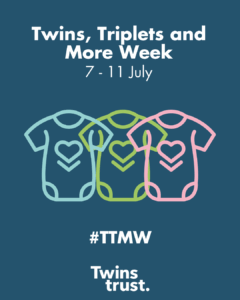7th July 2025
In recognition of Twins, Triplets and More Week, iHV is delighted to share this Voices Blog from Louise Bowman, Head of Family Services at the Twins Trust, and Natasha Fenwick. They discuss the important role of health visiting and highlight areas where families would benefit from tailored support.
“Twins, Triplets and More Week gives our unique community the chance to celebrate everything that is special about being a multiple birth family. It’s been a popular week in the charity’s calendar for a number of years. During the week, families share their stories and pictures about the joys and challenges of being a parent to twins, triplets or more.
Families with multiples face many barriers, from the huge impact on their finances and mental health to struggles finding childcare places. This week gives them a chance to talk about those issues too.”
Louise has worked at the charity since 2014. Louise has first-hand experience of raising twins and an older child, and is passionate that families with multiples receive the support and understanding needed. Louise is a trained parenting trainer and has managed volunteers and front-line services throughout her career.
Natasha has been at Twins Trust since 2016. She has worked in the Family Crisis Support team for almost nine years, alongside seven years as the charity’s Research and Resources Officer. Her aim is that the real-life experiences of families are represented in research, and that families can get the support they need at the right time as a result.
The importance of tailored support for multiple birth families
Health visiting plays an important role in supporting families to adjust to twins, triplets or more, but generic advice rarely works for them. Raising multiples is a challenge in many ways – last year Twins Trust’s research found that raising twins or triplets is more difficult in the UK than almost any other advanced OECD economy. It isn’t just raising a singleton twice over – it’s a fundamentally different experience.
During pregnancy, families receive specialist care and attention, and more regular scans, due to the increased risks. Once their babies are born, that extra care disappears but the challenges continue.
“When the twins were discharged, it was a huge and steep learning curve”(1)
Areas where families may need extra support include:
- Feeding: Standard feeding advice doesn’t account for the complexities of feeding two or three babies, which is time-consuming and demanding. Families of multiples need support that is both positive (supporting them to achieve their goals where possible) and realistic. It should also consider that multiples are usually born prematurely or at a low birth weight, and may need extra help in the beginning.
“There was no twin-specific advice on breastfeeding… Every medical professional assumed I would formula feed and was surprised or even advised against breastfeeding.” (1)
- Sleep: Safe sleeping guidelines rely on families having the space for more than one baby to sleep in one room. Whilst babies can initially share a cot, families may resort to sleeping babies together longer than is safe or in too-small sleep spaces if they lack the space for two or three cots. The Twins Trust website has information to support families to practise safe sleep, within the limitations of their space.
- Getting out and about: It can be difficult for families of multiples to get out of the house, due to the logistics of managing more than one baby. This is especially true for families living in an upstairs flat without a lift suitable for a double buggy. It’s helpful for healthcare professionals to bear this in mind when booking appointments – often it’s more appropriate to visit a family at home than ask them to attend a clinic.
“I had to struggle all the way to a children’s centre on my own with newborn twins.” (1)
- Speech and language: Twins, triplets and more sometimes develop language skills slower than their singleton peers, but this doesn’t always signal an underlying problem. Multiples can experience delays because of sharing attention from adults, and spending most of their time with a child of the same age. If there are concerns about a child’s development, it may be helpful to speak to someone who understands the twin or triplet dynamic, such as Twins Trust’s Professional Referral Service, who can identify when further support is needed – alongside your usual support from your local speech and language therapy team if you have concerns.
- Individuality: Fostering individual identities while maintaining a strong twin or triplet bond is a delicate balance that families have to consider. Parents often worry about how they are dividing their time and the lack of one-on-one attention their children get.
- Mental health: We know that families with twins and triplets are more likely to experience mental health difficulties – our State of the Nation report showed that 84% of families have at least one parent who experienced emotional or psychological challenges in the first year of their babies’ lives. Health visiting teams are ideally placed to identify families with perinatal mental health problems. Depending on the level of need, they can provide additional targeted support to families and connect them to wider community and specialist care as required. Raising awareness of the warning signs of perinatal mental health problems and where to seek help is important for this higher-risk group, as they’re often only identified once they reach crisis point.
- Cost of living: Buying equipment, nappies, and wipes for twins, triplets or more is expensive. We recommend referring families to their local baby bank for equipment (excluding things that need to be bought new, such as mattresses and car seats). The Stripey Stork website has a useful list of UK baby banks.
How you can help
Health visitors play a vital role in supporting multiple-birth families at one of the most demanding yet significant times in their children’s development. You can make a difference by:
- learning about the different ways the challenges of the early years affect families with multiples, and seeking out multiple-specific information and resources
- reflecting on the ways your advice may need to be adapted for multiple birth families
- signposting families to local and online services, such as twins clubs, baby banks, or Home-Start (see the Twins Trust website for additional support services)
- offering to visit the family at home instead of at a clinic, and allowing extra time to address concerns for each child
- celebrating the small wins – a successful feed, leaving the house for a walk, or feeling more confident as a parent all deserve celebrating.
“You have given me confidence to be able to be a twin mum on my own.”
Twins Trust is here to support you with all the issues mentioned above. For more information, contact us at [email protected] or visit our website.
“Really personalised help was given that was invaluable. I would highly recommend.”
References
- Twins Trust. (2019). Better Care of Multiples: an Exploration (BeCOME). https://twinstrust.org/static/5632cbad-a219-446d-b31efabdb7557e76/7c3543e7-8592-407e-a8daa9f59ac7ba32/BeCOME-Report.pdf London: Twins Trust.









